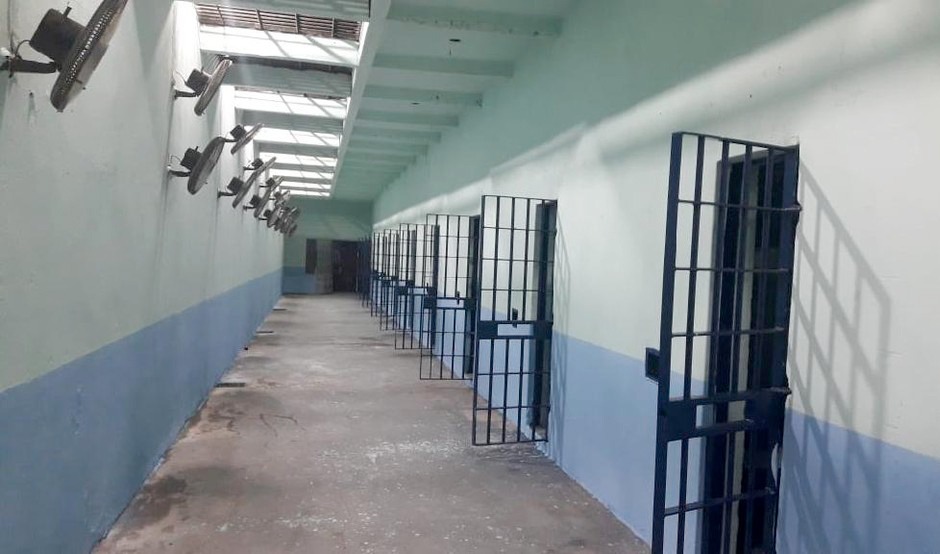The reality of COVID-19 inside prisons

Second day of event organized by the Defender's Office focuses on health care for people deprived of their liberty
This Tuesday (15th), the 4th International Conference on Access to Legal Aid in Criminal Justice Systems discussed current conditions and measures implemented by national governments to protect the rights of criminal defendants amidst the pandemic. The debate was based on international law, which requires these individuals to have access to healthcare, but it is not always the case. In an attempt to change the situation, several countries have taken important steps to reduce, examine and treat incarcerated persons.
The second day of the forum featured three online panels, held at different time zones so that audiences from around the world could attend. The first panel brought together representatives from Asia, including countries such as Nepal, Afghanistan and India, as well as international organizations. The second session, focused on Africa, Europe and the Middle East, featured speakers from civil society, the UN and countries like Palestine, Tunisia and the Republic of Congo. Dedicated to the American continent, the third session of the day presented speakers from Honduras, Argentina and Brazil.
Panelists agreed that there is little transparency regarding COVID-19 data within prison systems, and that the actual figures are likely much higher than announced. The widespread lack of access to justice, even in wealthy economies, is a strong indication that many governments are not giving due importance to the matter, stressed New Zealand’s Olivia Rope, from the Penal Reform International organization.
In general, it seems that several correctional institutions have chosen to restrict freedom of movement or simply isolate individuals allegedly infected by the virus, even though physical examinations are often relegated to security personnel. On the other hand, many countries have started to make greater use of technological solutions in order to facilitate meetings between detainees and their families and/or lawyers, although there is consensus that when it comes to convening with an attorney, this type of solution should be temporary, as it would limit the adequate right of defense.
In Palestine, the government has declared a state of emergency (renewable monthly), a decision viewed with reserve by non-governmental organizations because it often implies in violation of human rights, said Ammar Dwaik, Director General of the Palestinian Independent Human Rights Commission. In Gaza and the West Bank, efforts have been made to reduce prison population by relieving sentences and granting liberty on bail for those convicted of less serious crimes.
It is worth noting that in the West Bank there were no cases of COVID-19 inside correctional facilities, and in Gaza, only six detainees were diagnosed with the disease. In the specific case of Palestine, as online hearings are not allowed, detainees leaving prison premises is seen as a threat to their own health, leading to unclear sentences.
In the Republic of Congo, hearings were suspended in January, informed Bruno Langhendries, at Lawyers Without Borders. In the capital Kinshasa, the daily death toll has reached alarming levels, a situation aggravated by corruption: in the prison system, bribery is widespread, granting visitation, audiences and so on, a practice that only got worse with the pandemic. However, good practices are also in place in the Republic of Congo due to previously experiences, such as the Ebola epidemic. Committees have been set up to monitor the progress of the disease in the prison system and preserve individual rights to adequate healthcare.
In Nepal, the supreme court recognized the seriousness of the crisis and issued guidelines to maintain custody hearings during social isolation so as to release children and the elderly, in particular. The collegiate also sought to relieve penalties due to prison overcrowding and inadequate sanitary conditions. In parallel, adds supreme court justice Sapana Malla, measures have been implemented to improve hygiene conditions in correctional centers. Since the decision was made, almost a thousand people have been released, but the number is expected to increase significantly from now on.
Nepalese authorities have been oriented by UN guidelines, as well as other countries’ best practices. The same sources of “inspiration” are shared by the Indian government, said Madhurima Dhanuka, at the Commonwealth Human Rights Initiative. With the world’s fifth largest prison population and overcrowded prisons, India’s supreme court has also sought to facilitate the release of people belonging to high-risk groups, although there has not been general amnesty as seen in Afghanistan.
In March 2020, the Afghan government, in face of unsanitary conditions and overcrowding of prison units, decided to release detainees, specially critically-ill patients and individuals over 55 years of age. As a consequence of these and other initiatives, there are practically no more women in the country’s prison system according to Hussain Ramoz, from the Attorney General’s Office of the Islamic Republic of Afghanistan.
These efforts called for specific, faster procedures. At the height of the lockdown, legal operators worked on alternate days. The period was also marked by strong interlocution between the country’s three main judiciary institutions - the supreme court, defense attorney’s office and prosecutor’s office - so that all relevant issues could be discussed in a timely manner. In addition, 50 prosecutors and a high-level executive were hired to conduct the efforts, including systematic, daily visits to detainees.
Special concern
Amidst the chaotic scenario of the pandemic, there is special concern regarding the treatment of children and juveniles deprived of liberty, deemed particularly vulnerable to the virus and its indirect effects. After all, they may be more susceptible to diseases associated with difficult lives and drug abuse, which puts them at risk. The mental health of juveniles is also a matter of concern, especially when they are placed in isolation, which can lead to serious mental health issues.
According to Cedric Foussard, at the Terre des Hommes organization, some protective practices have been identified in different countries to address this specific group, including the release of those serving pre-trial detention or close to the end of prison sentence. Another initiative - one that is highly recommended by law operators - is to limit incarceration and invest in community services. In certain countries, detainees were given enhanced hygiene product kits and contact with the family (personally or virtually) was made easier.
Efforts in Latin America
In Brazil, “Justiça Presente” Program, an initiative of the National Justice Council (CNJ) and the United Nations Development Program (UNDP), has brought extremely positive results for the justice system, especially during the pandemic. Methodology diversification, reduction of prison population and the set up of an electronic system of sentence executions are some of the highlights cited by Luis Lanfredi, from CNJ.
Civil society agents have also mobilized to protect incarcerated women. There are currently 37,000 detained women in Brazil, almost 60% of them black, many without access to any type of health care, says Nathalie Fragoso, from the Human Rights Lawyers Collective. In order to protect the collective rights of these women, the Supreme Courte (STF) admitted a collective habeas corpus on February 20, 2018, allowing them to be placed under house-arrest. The Supreme Court understood that if the abuse is collective, the solution must also be collective. Since then, several collective habeas corpus have been issued in Brazil to discipline different topics, from drug use to the right of sunbathing in prisons.
Torture and virtual hearings were also on the agenda of Latin American panelists, including Glenda Mejía, from the National Committee for the Prevention of Torture in Honduras.
Police violence is common in the region, especially towards black and brown people. In Brazil, strong efforts have been made to eradicate this practice and denaturalize the culture of violence thanks to the free legal aid public system, argued Public Defender of Rio de Janeiro, Carolina Tessara. In this regard, custody hearings are seen as an effective instrument.
The importance of face-to-face hearings was stressed at the final stretch of today’s debates by Mariano Maciel, Public Defender of Argentina. If, on the one hand, the tool enables decisions in moments of isolation, on the other hand, it brings difficulties such as the lack of evidence materiality, human contact and low bandwidth, among other problems.
Since it is a new tool, there is still a lack of adequate training for its use, putting at risk the liberty of individuals in favor of a learning process that is still in progress. Therefore, although it is feasible to have online audiences in some cases, it is necessary to make sure the defendant gets a fair trial. From now on, said the panel’s moderator, Public Defender André Castro, there will undoubtedly be a lot of debate surrounding the use of such tool.
VOLTAR






